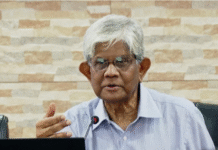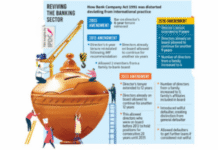The country’s rice prices are the highest among five countries — Bangladesh, India, Pakistan, Thailand and Vietnam.
According to the latest report of the UN Food and Agriculture Organization (FAO) and the daily food crops report of the health ministry, rice price has decreased in those countries.
As a result, Bangladesh can import coarse varieties of rice at a rate of Tk 33-40 a kg — lower price than local market.
Price of medium and fine varieties of rice also didn’t drop. Rice of medium BR-28 variety and same quality were being sold at Tk 52-56 a kg at retail shops in Dhaka – a 10 per cent higher than the price in the previous year. Fine varieties of rice are being sold at Tk 60-62 a kg and najirshail rice at Tk 65-70 a kg – an 8 per cent rise from the previous year.
As countrywide Covid-19 restrictions decreased the income of the people working in the informal sector, people of the lower income bracket have fallen in a crisis because of high prices of essentials including rice, sugar and edible oil.
Former agriculture secretary and caretaker government adviser AMM Shawkat Ali told Prothom Alo the purchasing power of poor people has dropped amid coronavirus pandemic. Many people saw their earnings dropping during ongoing restrictions. Income of many people was also stopped. Amid this circumstance, they may have less food due to high price of rice. The government should expand the open market sale of rice immediately in addition to taking initiative to increase supply, ex-caretaker government adviser observed.
More yields, godown full
Nearly 35 million (3.5 crore) tonnes of rice are produced in the country during boro, amon, aush harvests. Nearly 19.6 million tonnes of rice were produced in last boro harvest. The agriculture ministry estimated rice production crossed 20 million (2 crore) tonnes during this year’s boro harvest.
Rice stocks have reached one and a half years-high to 1.26 million (12.66 lakh) tonnes at the government warehouses, according to the latest report.
Asked why rice price is on the rise, the owner of one of the country’s largest rice mill Majumdar Auto Rice Mill, Chitto Majumdar told Prothom Alo price of rice shouldn’t be increased so much considering the production cost. Many new middlemen have been stocking paddy in the markets. They are increasing the price of rice and paddy. The government should take step after looking into the matter immediately, he added.
Initiative for import
The government has taken initiative to import rice again. Food secretary Mosammat Nazmanara Khanum told Prothom Alo, “We have taken initiative to control the price by importing the grains through government and private channels. A proposal has been sent to the Prime Minister’s Office to reduce the tariff on import for private sector.”
Asked on the price hike, the secretary said farmers produced coarse varieties of rice less than they did it before resulting in a low supply of rice and a price hike.
According to the USDA report on the global situation of agriculture production, released on Tuesday, Bangladesh will have to import rice as the country’s domestic production will reach at 35.3 million (3.53 crore) tonnes against a demand of 36.1 million (3.61 crore) tonnes.
Currently, an importer has to pay 62.5 per cent of duty to import rice. The government reduced the amount to 25 per cent for the private sector. The tax facility was in effect till 30 April this year. Now private sector’s importers said they can’t import rice with high tariff anymore.
According to the ministry sources, the government is now mulling to set a tariff on import so that price of rice can fall and farmers won’t be affected as well.
People also want to purchase rice at a low price.
Sadek Hossain, who drives a motorcycle on hire, went to the open market sale point of the Directorate General of Food at the capital’s Dhakkhin Bishil to buy rice. He said, “Police fined me for two days after I went out to drive the motorcycle defying the strict Covid-19 restrictions. Now I have no money. That’s why I came to purchase the rice at the government-run shop.”
*This report appeared in the print and online edition of Prothom Alo and has been rewritten in English by Hasanul Banna










